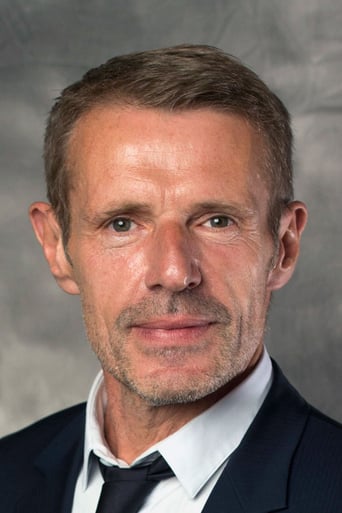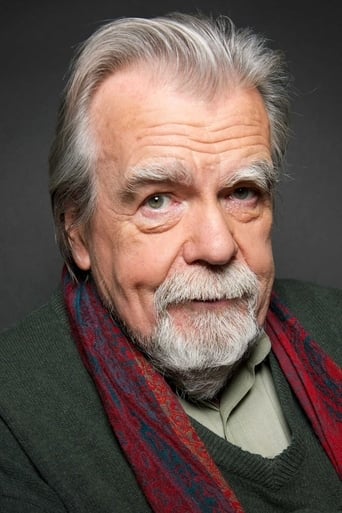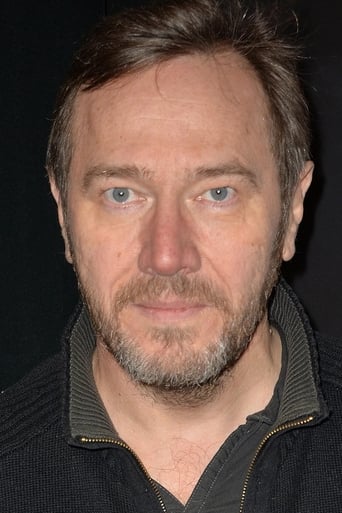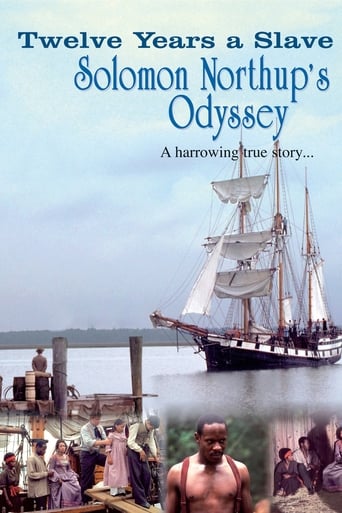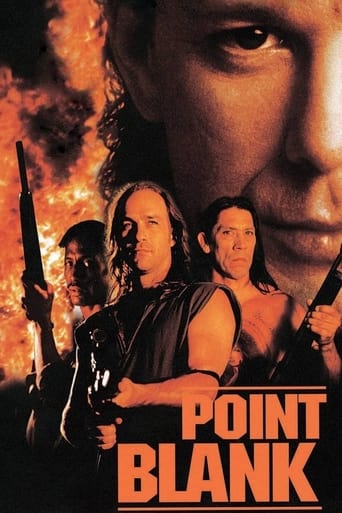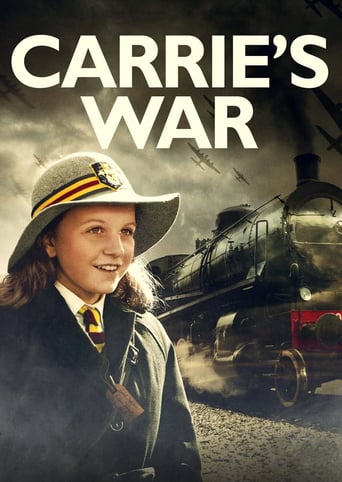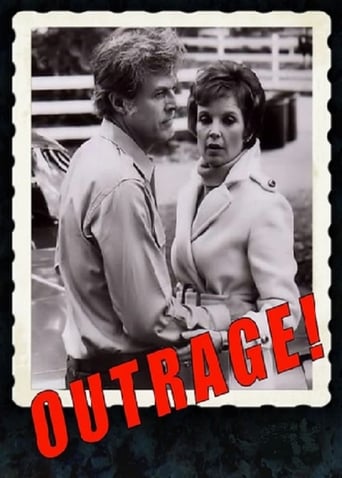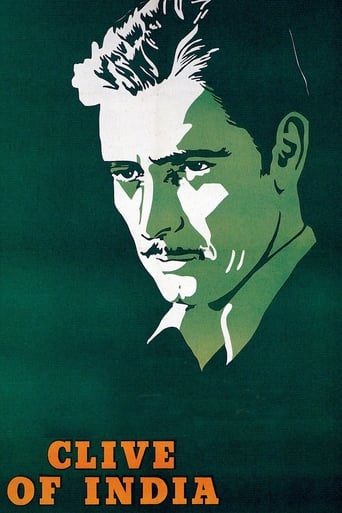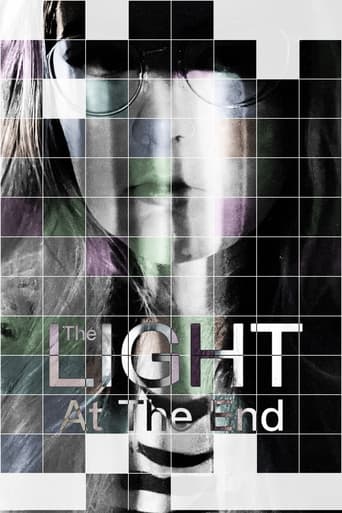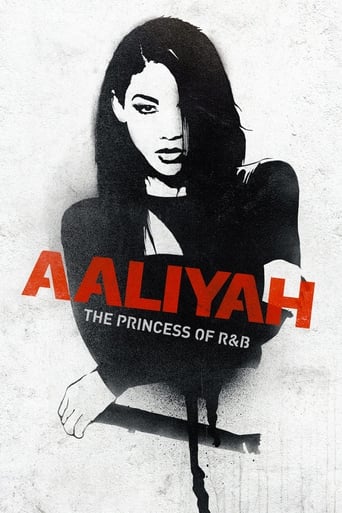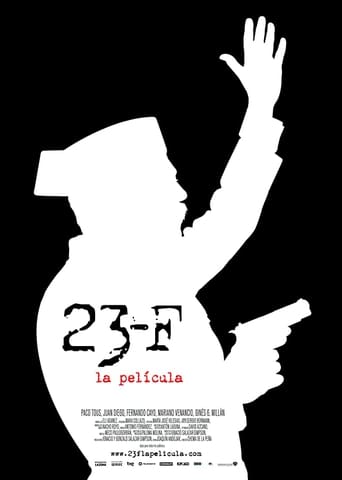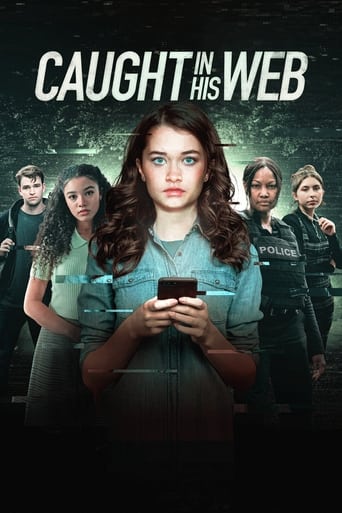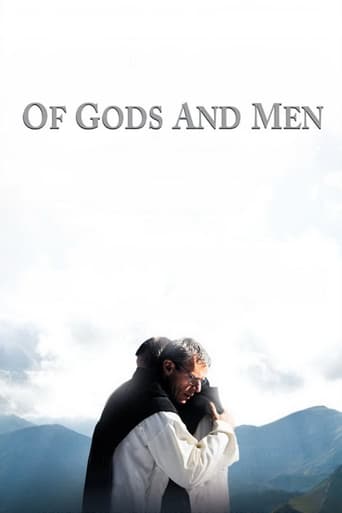
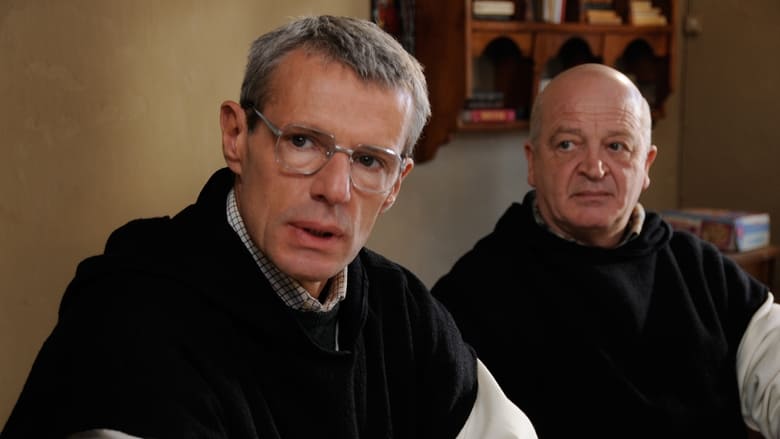
Of Gods and Men (2011)
French drama based on the 1996 kidnapping and killing of seven monks in Algeria. A group of Trappist monks reside in the monastery of Tibhirine in Algeria, where they live in harmony with the largely muslim population. When a bloody conflict between Algeria's army and Muslim Jihadi insurgents disrupts the peace, they are forced to consider fleeing the monastery and deserting the villagers they have ministered to. In the face of deadly violence the monks wrestle with their faith and their convictions, eventually deciding to stay and help their neighbours keep the army and the insurgents at bay.
Watch Trailer
Cast


Similar titles
Reviews
A close-to-universal acclaim, a 10-minute standing ovation at the Cannes Festival and as the most profitable French movie, no one saw 'Of Gods and Men" coming in 2010, but everyone eventually went to see it."Of Gods and Men" is the cinematically sober yet emotionally powerful chronicle of one of the saddest chapters of the Algerian Civil War in the 90's: the assassination of seven monks in the Atlas Mountains by an Islamist group that has nothing to envy from today's routinely barbarity that shake the Middle East without that generating much reaction. The mention of the context is crucial because any misinformed viewer might misunderstand the story's purpose and take it as another illustration of the Islam's innate barbarity. Indeed, this is one of these movies that might be appreciated for the wrong reasons.So, it's all to the credit of director Xavier Beauvois to play fair with the facts and not portray the crime as an isolated one, it's a part of a whole barbaric chain of events that blindly touched the whole of ALgeria. 1996 and 1997 were perhaps the darkest years of its history as hundreds of thousands of civilians, generally villagers were mercilessly killed and in the most gruesome way, hatchets, throat slit, and so forth. Of course, it would take half the review to enumerate the causes of these movements, the mujaheddin in Afghanistan sponsored by the CIA, and whose faction from Algeria had time to make their bones before coming back to Algeria, where the cancellation of the Islamist party rung like a Declaration of War.I think this secretly sponsored extremism is the real core of the problem (look at ISIS now), more than the tormented post-colonialism relationships. The citizenship of these monks had no more relevance than for the Croatian workers who were savagely assassinated under the sight of a poor Algerian. The only relevance the Algerian War might have is that Christian, the prior priest, played by Lambert Wilson, was a former military, who served in the War and thought he had to stay in order to establish some sort of reconciliation. But Xavier Beauvois doesn't waste the script to analyze each one's backstory, it's about eight priests who know their lives are at stakes, and must make a choice: leaving or dying.It's a story of an ethical conflict. The monks belong to a Cistercian order and they made a vow of stability. The threat is like the test of their own faith. Of course, the vow of stability mustn't be at the expenses of their own lives; the sacredness of life, let alone of these eight men, measure up to higher levels than the strict obedience to their vows. But the monks found God in the Atlas Mountains, they fulfilled their duty by providing medical care to the villagers, Michael Lonsdale, plays Luc, the elderly priest and doctor of the group. They also insist on not interfering with people's faith. In fact, Michel is as literate on Quran as on the Bible.The rest of their time consists on religious chants, prayers and deep contemplation. Still, Xavier Beauvois never tries to make them look pretty on the screen. No traveling or other shots, its mainly steady fixes where all you have to do is contemplate the monks, and watching them, absorbed by their thoughts and their doubts. This is a great choice as it allows the movie to embrace the very lifestyle of their protagonists, and allow us, as viewers to penetrate the moral conflict that drives the narrative. These stoic moments then becomes the foil to more powerful and thrilling scenes where they all discuss whether they should leave because of the threats. And they don't share the same views at all.Of course, the film isn't just all talking and contemplation and features many strong interactions with the Algerian people, from the military people who asked them to leave for their own good to the terrorists themselves. It's not one of these moments where you're wishing for the good guys to take the right decision, but where you understand what lies behind these very decisions. Why does Luc give medicine to terrorists? Why does he pray for the soul of one of them murderers? Why do they ignore the warning of the Army, exasperated to see them helping the terrorists? Well the answers to these questions are not given, but simply illustrated by their decision to stay. Their life has a meaning, and so will their death. It all leads to the point where the monks interpreted the threat as some test from God, as if it gave its full meaning to their presence in Algeria. Religion is all made of symbols, and they didn't just look at the risks, but at the way they perceived their duty on Earth, as if soul-preservation counted more than life. . And that very soul they preserve is of the Christ. It's like the mystery of the incarnation finally revealing some of its mysteries. This is one of the few metaphysical moments of the film, but it's immediately followed by its beautiful emotional climax, a last dinner that carries the same resonance as Jesus' last supper; with the music of "Swan Lake" in the background.After having kept a restrained tone all through the film, shooting at respectful distance, we finally get the luxury of close-ups and music, as we can see these monks in full faces, smiling and shedding a few emotional tears, not because they just defied barbarity, it's not about proving their worth as soldiers as God, it's not even about testing the empathy required by their faith to its most sincere limit. It's because they're finally in peace with themselves.At a time where you couldn't necessarily triumph in the war against barbarity, you could at least be in peace with yourself, and that was enough a victory.
'Of Gods and Men' is a low-key, understated film about a group of French priests living in a monastery in Algeria. They are noble, kindhearted individuals who genuinely have an affection for the local native people, but their lives get threatened by the growing violence during the Algerian Civil war in the mid-1990s.This film works for the most part due to the characters involved. All the priests in the monastery are normal, relatable individuals. They have uneventful, mundane lives with nothing much to look forward to except praying to God and being kind and helpful to others. They make an active effort to mingle with the local Muslim people. They join in during the local rituals, fairs and religious ceremonies. Some of the priests also make an effort to learn about the Koran and not stay restricted to their own religious teachings. They help the poor with clothes and shoes and also with medical treatment and medicines. So clearly the viewer can't help but like and adore these kind,elderly righteous group of priests. It is because of this very fondness for them, we also feel the horror of the situation that they get to face in the film. With the gradual spread of Civil War throughout the Algerian country during the mid 1990s, there seemed to be a rise of intolerance towards foreigners and followers of other faiths among native extremists and the priests also fail to escape this volatile and dangerous predicament. After getting attacked on one occasion by a group of terrorists, they find themselves stranded and helpless. They face the dilemma of having to choose their lives' safety and leave the country or stay and continue to help the poor and beaten down by putting their own lives at risk.The style of storytelling is fantastic. The director makes us really feel for the characters involved. The debates and conversations that the priests have during their meetings reminded me very much of '12 Angry Men'. The director also makes an effort to show that violence existed on both sides. The manner in which the Algerian Army searched and investigated the monastery on suspicion that the priests were helping the terrorists was eerily similar to the way the terrorists had attacked the monastery earlier. The director shows that the priests were caught in the middle of two sides who were intent on destroying each other through violence. The look of the film is also very realistic. The director with the production designer succeeds in recreating the feel of the relevant period. There are also a few visually meaningful, but quiet scenes involving sceneries that I loved.The only problem that I had with the film was that I thought the screenplay gets a bit bogged down in the middle with repetitive scenes and it gets a bit too preachy and melodramatic in an otherwise very well written screenplay. The acting is solid form everyone, with a special mention for Michael Lonsdale.So although I think the film is not perfect, it is still a rewarding watch with great acting, directing and a good screenplay and I also loved the scene with which the film ends. It is a quiet scene with no dialogue, but it is a scene which says everything about acceptance, embracing others and religious equality.
OF GODS AND MEN tells the real story of a band of French Christian monks who continued to live in Algeria after the French gave that country its independence. They live in harmony with the local Muslim community, offering everything from medical skills to advice on love, but the coming of the Algerian Civil War ends that. The tension is ratcheted up as the countryside becomes militarised, with roadblocks and corpses appearing. The Islamist GIA turn up and demand the monks leave, or else they will be murdered. The monks discuss among themselves and after a lot of thought and debate they decide to stay. Eventually (spoilers) they are seized and beheaded, although the film carefully doesn't say by whom as nobody knows if the GIA or the government were responsible (especially as the DRS - Algerian intelligence - was manipulating the GIA throughout the war). It's a portrait of faith and humanity that is just subtle - thanks to fine acting and muted direction - enough to work, although the 'Last Supper' scene comes perilously close to over-doing it. It's a rare film that is serious about God, which makes this worth the watch alone.
This was another one of those French films that without reading about it in the book 1001 Movies You Must See Before You Die I would never have heard or probably cared about, and besides the recommendation I was looking forward to seeing a James Bond film star. Basically a group of monks in a monastery are interrupted while making peaceful prayers, performing medical assistance and interacting with the community when there is a threat be an Islamic fundamentalist group. Christian (Lambert Wilson) the elected leader of the monks refuses protection of authority who are known to be corrupt, the monks split on the decision as to whether to stay in the monastery or flee to Algeria, but before the decision is made Ali Fayattia (Farid Larbi) and his group of fundamentalists demanding a doctor and medical supplies. Christian requests the requests of Fayattia and his group, who leave the compound in peace, but before he can grant protection on it he is captured, tortured and killed by government forces, and despite the danger and potential death they are faced with the monks stick with their morals and maintain their commitment to their religion and the local people. During a night time raid the terrorists ultimately seize control of the monastery, capturing the monks and holding them hostage, they are forced to walk a snowy path toward their fate, and the conclusion sees some words written by one of them, bravely made out before faced with death. Also starring Moonraker's Michael Lonsdale as Luc, Olivier Rabourdin as Christophe, Philippe Laudenbach as Célestin, Jacques Herlin as Amédée, Loïc Pichon as Jean-Pierre, Xavier Maly as Michel, Jean-Marie Frin as Paul, Abdelhafid Metalsi as Nouredine, Sabrina Ouazani as Rabbia, Abdallah Moundy as Omar, Olivier Perrier as Bruno and Adel Bencherif as Terrorist. I will first admit that most of the film was hard to follow, by I just about got that monks were against terrorists, but to be honest I liked the slower moments of the film, the talks amongst the religious men, including the memorable simply music scene featuring "Swan Lake" by Tchaikovsky, so with just enough thrilling moments like death and some interesting quieter sequences it adds up to a watchable drama. It was nominated the BAFTA for Best Film not in the English Language. Good!


